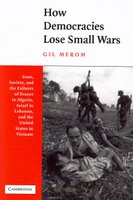





|
|
humint






|
|
|
|
|
|
Instrumental Dependence, Normative Difference, and Political Relevance With these definitions in mind, the fundamental elements of my thesis can presented. I submit that modern democracies lose protracted small wars because in situations of deep instrumental dependence, the politically most relevant citizens create a normative difference of insurmountable proportions. Essentially, what prevents modern democracies from winning small wars is disagreement between state and society over expedient and moral issues that concern human life and dignity. The details of this thesis and the consequences of my argument are discussed throughout this book. Nevertheless, I offer here a preview of the mechanism of democratic failure in small wars. This presumably trivial logic is illustrated in Figure 1.1. The vertical axis represents increasing levels of tolerance to casualties and the horizontal axis represents increasing levels of tolerance to brutal engagement of the enemy. The curve constitutes a theoretical continuum of combinations of tolerance for Casualties and tolerance for violence that a state has to achieve in order to win Q war. This curve of the balance-of-tolerance illustrates how the two types of tolerance are related. The less tolerance a society displays in one dimension, the more it must display in the other, if the state is to win the war. The idea of a curve of the balance-of-tolerance can be understood even more clearly by considering the two theoretical extremes (or ideal types) that are represented in zones A and B. Zone A represents the place of a state whose society is ready to accept great sacrifices but vehemently opposes violence against others - that is, this society may be heavily bled by others, but being thoroughly pacific, it will refuse to shed their blood. Obviously, no matter how well endowed and equipped this "altruist" state is, it can hardly fight, M Kugler and Domke, "Comparing the Strength of Nations," 39-71. Let alone win, conventional ground wars. Zone B represents a state whose society is thoroughly unscrupulous but is also hypersensitive to casualties. Such a "psychopathic" state is almost as unfit as the altruistic state to win ground wars, though for an entirely different reason.
It is important emphasize that tin1 problem of achieving a balance of tolerance, and the success of politically relevant groups to create a debilitating normative difference, are relatively recent, and confined to democracies. Traditionally, the use of violence abroad did not involve difficulties it) home. Subjects were often unwilling to sacrifice their money or life to underwrite their leaders' military adventures abroad, but they did not care about the fate of foreigners, be they insurgents or the civil population that supported the latter. Indeed, as long as attitudes toward inflicting violence externally did not change, the question of whether and how to conquer, subjugate, and pacify communities was dominated only by expediency - namely, the concern over the availability of resources. Ultimately, only the development of democratic political institutions and an educated liberal constituency ill the West have changed this state of affairs. It is also important to note that the normative difference in warring democracies is likely to be most pronounced in cases of small wars because they are not existential. And it is equally important to understand that it takes time for democracies to experience the full effect of the normative difference. It simply takes casualties to accumulate and brutality to increase and be "observed" by society before the anti-war constituency acquires a critical mass and acts with full force. Once these have been achieved, the anti-war constituency can take control over the agenda, shape the terms of the public debate, and shift the war's center of gravity from the battlefield to the marketplace of ideas, where the state's capacity to pursue its objectives in checked. |





